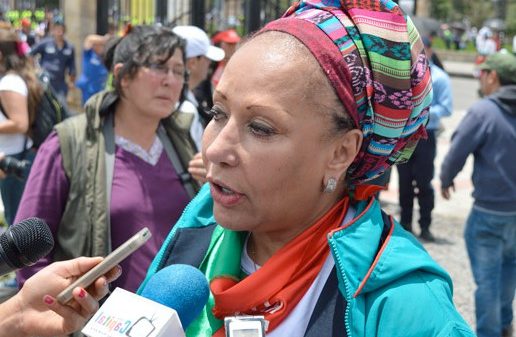
Frente Amplio por la Paz (led by ex-senator Piedad Córdoba and prominent Unión Patriótica politician Aida Abella), found contradictions between resident testimony and the military’s story. Photo: Pablo Donato / Amy Farrell
Ellis Carver argues that the official account of the recent FARC attack in Cauca may not be the whole truth
It lasted a few minutes, or it lasted more than six hours. It was an ambush, or it was head-to-head combat. It was an unprovoked attack, or a provoked attack, or it was self-defence. It was raining when it started, or maybe it wasn’t.
What we know for sure is that 11 soldiers were killed and 19 were hurt during combat with the FARC in Buenos Aires, Cauca, between the night of Tuesday April 14 and the morning of Wednesday April 15. The rest we can’t be quite so sure about.
You wouldn’t have any reason to doubt the official account if you only read the mainstream Colombian press, or watched the mainstream Colombian news. Their accounts would have you believe that the attack was an unprovoked ambush which lasted no longer than an hour, and that the soldiers had gone to the sports complex in Buenos Aires to escape the rain. They were sleeping when they were attacked.
What’s conspicuously absent from those accounts are interviews with the locals in Buenos Aires. Besides one report from Caracol which includes two very brief interview excerpts with Buenos Aires residents, I have not found a single report from the mainstream Colombian press which includes interviews with the people who live in the town.
However, a group called Frente Amplio por la Paz, led by ex-senator Piedad Córdoba and prominent Unión Patriótica politician Aida Abella, did interview 300 residents of Buenos Aires, and found some contradictions between their testimony and that of the military. The residents interviewed claimed the combat lasted five and a half to six and a half hours, which would suggest a head-to-head confrontation, not a sneak attack. They also claimed it was not raining when the shooting started, but only started raining a few hours after the first shots were fired.
The residents further claimed that they asked the military to leave the sports complex as long ago as March 19, since the complex is only 50 metres from a civilian area, but the military refused, claiming that they had been ordered to stay at the complex by superior officers. Setting up a military camp close to a civilian population centre is a violation of International Humanitarian Law.
In response to these conflicting accounts, many would ask, “Why believe Piedad Córdoba or Aida Abella?” Córdoba, after all, was prohibited from holding public office for 18 years in 2010 because of an illegal association with the FARC. Abella only recently moved back to Colombia after 17 years in exile in Switzerland. Her political party, the UP, was a tool of the deservedly despised FARC.
Indeed, there are legitimate reasons to doubt both Córdoba and Abella. But shouldn’t we also ask why we should believe what the military says?
This military, after all, was only recently caught illegally spying on the peace talks. Several paramilitaries have claimed that the military worked with them to commit massacres in Meta, Barranca and Uraba. Perhaps the most horrifying crime committed by the military were the “false positives”, in which men from poor neighbourhoods in various parts of Colombia were killed by the military, then dressed in guerrillera uniforms and presented as terrorists who had been killed in combat.
Members of the armed forces who were convicted of these crimes were, until recently, likely to wind up in the infamous Tolemeida “Resort” prison, where they continued to receive a salary, got promoted, came and went as they pleased, lived in cabins instead of cells, ran businesses and took vacations in San Andres and Cartagena. Semana published its first exposé about the notorious prison in April 2011, but it remained open until January 2015. In one of the Semana articles, an inmate claimed that if half of the soldiers there started talking about what really happens in the war, colonels and generals would soon be joining them in prison.
This is just a brief overview of a fraction of the military’s crimes, but these facts alone should be more than enough to inspire us to return to the question I posed before: “Why should we believe the military?” If we allow the truth to be another casualty of the armed conflict in Colombia, a peaceful resolution to the war will continue to elude the country.
For more on what happening in the peace process, see our in-depth news feature.
By Ellis Carver





